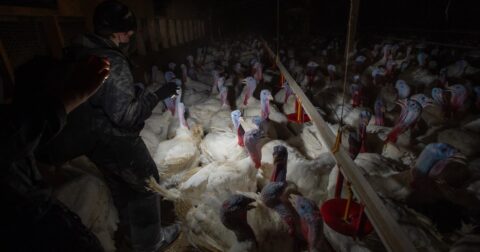News
A Major Agreement to Protect the Amazon Is Falling Apart After 20 Years
Climate•6 min read
Reported
A federal judge recently overturned a Kansas law that made it illegal to conduct undercover investigations on factory farms. The ruling set a new precedent for Ag-Gag laws in the U.S.


Words by Holly Pate
For nearly 30 years, a Kansas law made it illegal to conduct undercover investigations on factory farms. A federal court now rules that the state cannot prohibit the public from taking pictures or recording videos of animal agriculture even if the intent is to “damage an enterprise.”
The Kansas Farm Animal and Field Crop and Research Facilities Protection Act enacted in 1990 is the earliest example of what are now called “Ag-Gag” laws. But just a decade after it was first passed, a federal judge found parts of the law violated the First Amendment, and it was later appealed.
In January, Kansas U.S. District Court Judge Kathryn Vratil overturned the majority of Kansas’s Ag-Gag law for infringing on free speech. With the third-most cows of any state, animal rights activists worry that the importance of agriculture in Kansas will be a driving force behind this law’s continued controversiality and possible endurance.
Specifically targeting deceitful speech used to gain entry, rather than just banning the act of being at a factory farm or slaughterhouse without permission, 25 other states have attempted to pass modern-day Ag-Gag laws, with six of them succeeding including Montana, North Dakota, Missouri, Arkansas, North Carolina, and Kansas.
In 2018, the Animal Legal Defense Fund, an animal law advocacy organization, sued the state of Kansas contending that the law targets journalists and animal rights activists who investigate the agriculture industry and criminalizes undercover examinations that “have revealed systematic and horrific animal abuse in the commercial animal agriculture industry to authorities and to the public.”
For example, the Animal Legal Defense Fund cited a Nebraska investigation that documented pigs suffering for weeks with intestinal ruptures and large open wounds, and a Tyson Foods slaughterhouse in Texas where hundreds of chickens were left to suffocate on overcrowded conveyor belts.
Brant Laue, the Kansas solicitor general representing the state, said that Ag-Gag laws act as necessary and separate laws for trespassing, similar to those for nuclear-generating facilities.
“This is an attempt to use the First Amendment as [a] sword to gain access to private property that’s normally protected by trespass,” Laue said. “Entering a property is not speech.”
Alan K. Chen, a civil rights attorney with the University of Denver Sturm College of Law, described the differences between Ag-Gag and general trespassing.
“This law specifically targets tactics used by undercover investigators,” Chen said. “Even if this were a technical trespass under Kansas law, the types of interests underlying trespass law are [the] protection of the property owner’s ownership and possession of the land.”
When someone accesses a location through deception, hiding their affiliation with a news organization or animal protection group, it does not cause the type of harm that trespassing laws are designed to protect, Chen added.
In the recent Kansas decision, the court denied the state’s motion to have the case thrown out and granted most of the Defense Fund’s wishes, barring the state from enforcing Ag-Gag law. The court ruled to maintain the portions of the law that criminalize physical damage to animals and facilities.
“For 30 years, Kansas lawmakers have suppressed whistleblowers from investigating cruel conditions on factory farms with this unconstitutional law,” Stephen Wells, the Animal Legal Defense Fund Executive Director, said. “This decision is a victory for the millions of animals raised for meat on factory farms.”
Ag-Gag laws were recently ruled unconstitutional in Utah, Idaho, and Iowa. Litigation against North Carolina’s and Arkansas’s Ag-Gag laws are on-going.